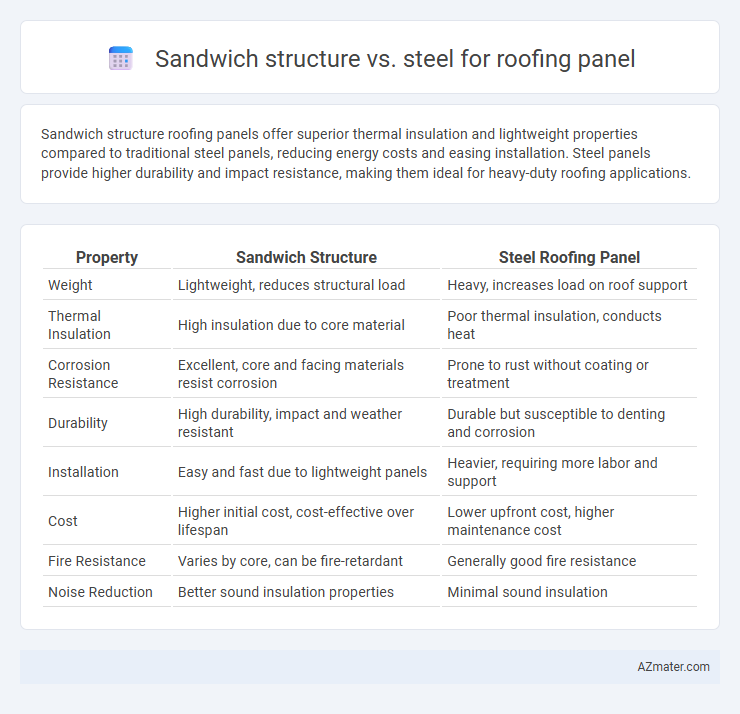Sandwich structure roofing panels offer superior thermal insulation and lightweight properties compared to traditional steel panels, reducing energy costs and easing installation. Steel panels provide higher durability and impact resistance, making them ideal for heavy-duty roofing applications.
Table of Comparison
| Property | Sandwich Structure | Steel Roofing Panel |
|---|---|---|
| Weight | Lightweight, reduces structural load | Heavy, increases load on roof support |
| Thermal Insulation | High insulation due to core material | Poor thermal insulation, conducts heat |
| Corrosion Resistance | Excellent, core and facing materials resist corrosion | Prone to rust without coating or treatment |
| Durability | High durability, impact and weather resistant | Durable but susceptible to denting and corrosion |
| Installation | Easy and fast due to lightweight panels | Heavier, requiring more labor and support |
| Cost | Higher initial cost, cost-effective over lifespan | Lower upfront cost, higher maintenance cost |
| Fire Resistance | Varies by core, can be fire-retardant | Generally good fire resistance |
| Noise Reduction | Better sound insulation properties | Minimal sound insulation |
Introduction to Modern Roofing Materials
Sandwich structure roofing panels consist of two metal sheets bonded to a core material like polyurethane or mineral wool, offering excellent thermal insulation and lightweight properties. Steel roofing panels provide superior durability and strength but often lack the same insulation efficiency and weight advantages found in sandwich panels. Modern roofing materials emphasize energy efficiency and ease of installation, making sandwich panels a preferred choice for sustainable building designs.
Overview of Sandwich Structure Roofing Panels
Sandwich structure roofing panels consist of two metal facings bonded to an insulating core, offering superior thermal insulation and lightweight durability compared to traditional steel panels. These panels enhance energy efficiency by reducing heat transfer and can significantly decrease structural load due to their lower weight. Their composite design provides excellent resistance to corrosion, weathering, and sound, making them ideal for modern roofing applications.
Key Features of Steel Roofing Panels
Steel roofing panels offer exceptional durability and high resistance to harsh weather conditions, making them ideal for long-term roofing solutions. Their lightweight nature reduces structural load, while corrosion-resistant coatings enhance lifespan and minimize maintenance requirements. Steel panels also provide excellent fire resistance and energy efficiency due to reflective coatings that help regulate building temperatures.
Comparative Weight and Structural Support
Sandwich roofing panels typically weigh significantly less than traditional steel panels, reducing the overall load on the building structure and enabling easier handling and installation. The multi-layer design of sandwich panels, often including insulation cores like polyurethane or polystyrene, provides enhanced structural support and thermal efficiency compared to solid steel panels. Steel roofing panels offer high strength and durability but require stronger underlying frameworks due to their heavier weight, which can increase construction costs and complexity.
Thermal Insulation and Energy Efficiency
Sandwich structure roofing panels significantly outperform steel panels in thermal insulation due to their layered composition, which typically includes rigid foam cores such as polyurethane or polystyrene, providing low thermal conductivity and reducing heat transfer. This enhanced insulation contributes to greater energy efficiency by minimizing the need for heating and cooling in buildings, leading to lower energy consumption and utility costs. Steel panels, while durable and strong, offer minimal thermal resistance, making them less effective in maintaining consistent indoor temperatures compared to sandwich panels.
Durability and Weather Resistance
Sandwich structures offer superior durability and weather resistance compared to traditional steel roofing panels due to their multi-layer composition, which includes insulating cores that prevent thermal bridging and moisture ingress. The composite nature of sandwich panels enhances resistance to corrosion, impact, and UV radiation, significantly extending their lifespan in harsh environmental conditions. Steel panels, while strong, are more prone to rust and require regular maintenance to maintain their protective coatings for weather resistance.
Installation and Maintenance Requirements
Sandwich structure roofing panels typically offer faster installation due to their lightweight composition and integrated insulation layers, reducing labor time and complexity compared to traditional steel panels. Maintenance for sandwich panels is minimal, as their composite design resists corrosion and thermal bridging, unlike steel roofing that often requires regular inspections and treatments to prevent rust and degradation. The durability and lower maintenance demands of sandwich panels make them cost-effective solutions over steel roofing in environments prone to moisture and temperature fluctuations.
Cost Analysis: Sandwich Structure vs Steel Panels
Sandwich roofing panels typically offer lower lifecycle costs compared to traditional steel panels due to their superior thermal insulation, reducing energy expenses significantly over time. The initial installation cost of sandwich panels is often higher, but savings are realized through decreased heating and cooling requirements and reduced maintenance due to corrosion resistance. Conversely, steel panels present a lower upfront cost but incur higher long-term expenses related to insulation upgrades and ongoing maintenance needs.
Environmental Impact and Sustainability
Sandwich structure roofing panels offer superior thermal insulation compared to traditional steel panels, leading to reduced energy consumption and lower carbon emissions in buildings. The core materials, often made from recyclable foam or natural fibers, enhance their sustainability profile by minimizing resource depletion and landfill waste. Steel panels, while durable and recyclable, generally have a higher embodied energy due to intensive mining and manufacturing processes, making sandwich panels a more environmentally friendly option for roofing applications.
Choosing the Right Roofing Panel for Your Project
Sandwich structure roofing panels offer superior thermal insulation and lightweight properties compared to traditional steel panels, making them ideal for energy-efficient buildings and faster installation. Steel roofing panels provide exceptional durability, resistance to impact, and cost-effectiveness, especially suitable for industrial or heavy-duty applications. Selecting the right roofing panel depends on factors such as climate, insulation requirements, budget constraints, and structural load capacity to ensure optimal performance and longevity.

Infographic: Sandwich structure vs Steel for Roofing panel
 azmater.com
azmater.com